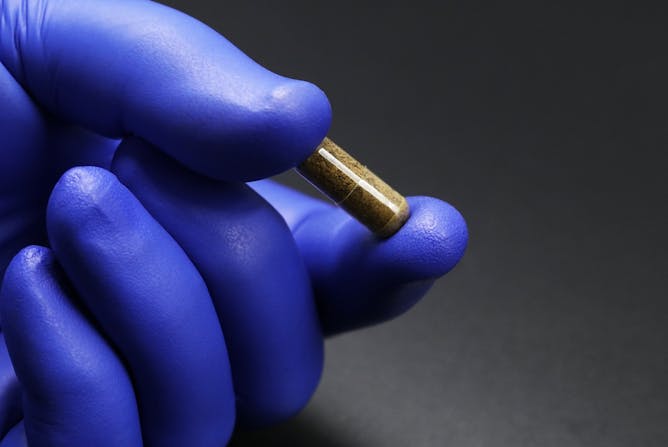|
Damar Hamlin’s injury during Monday night’s NFL game may have been caused by commotio cordis — a blunt force injury to the heart. Hamlin was resuscitated on the field, but commotio cordis is often fatal. Fortunately it’s rare, but it most often affects young athletes, with an average age of 13. That’s why prevention is so important.
Today in The Conversation Canada, Grant James Dickey, Haojie Mao, Kewei Bian and Sakib Ul Islam of Western University discuss what commotio cordis is, how it occurs and, most importantly, what researchers are doing to help prevent it.
They write, “Recent events may increase awareness of this rare but serious injury, and help promote improvements in protective equipment in many sports.”
Also today:
|

NFL player Damar Hamlin’s injury during a game on Jan. 2 may have been a heart injury called commotio cordis. Researchers are working on ways to prevent this rare but often fatal sports injury.
(AP Photo/Joshua A. Bickel)
Grant James Dickey, Western University; Haojie Mao, Western University; Kewei Bian, Western University; Sakib Ul Islam, Western University
Commotio cordis is the result of blunt trauma to the heart, and is one of the leading causes of sudden cardiac death in youth sports. Improvements in protective equipment may help prevent it.
|

Women display a poster during a rally against the persecution of Rohingya Muslims outside the Myanmar embassy in Jakarta, Indonesia.
(AP Photo/Tatan Syuflana)
Deeplina Banerjee, Western University
Canada’s new Indo-Pacific strategy must include providing assistance to Rohingya women who have suffered sexual violence.
|

A new law will erode public oversight into police misconduct. In this July 2021 photo, police are seen clearing a homeless encampment in Toronto.
THE CANADIAN PRESS/Chris Young
Monika Lemke, York University, Canada
Upcoming changes to how complaints against Ontario police officers are processed will make it even harder to monitor human rights violations by police.
|

It’s more necessary than ever before to re-examine the fundamentals of our economic order.
(Shutterstock)
Johannes Steizinger, McMaster University; Helen McCabe, University of Nottingham; Thimo Heisenberg, Bryn Mawr College
Psychological and social perspectives on economy that were developed by 19th-century philosophers can help us re-imagine economics with a human face.
|

La greffe de matières fécales consiste ni plus ni moins à remplacer le microbiote intestinal d'un receveur malade par du matériel fécal provenant d'un donneur sain.
(Shutterstock)
Raúl Rivas González, Universidad de Salamanca
Le transfert de microorganismes vivants de donneurs sains à des patients malades comporte certains risques.
|
Arts
|
-
Christina Philippou, University of Portsmouth; Sarthak Mondal, University of Portsmouth
Pelé’s death in December saw the world mourn one of football’s all time greats, but his contributions to the business of football were by no means less great.
|
|
Environment + Energy
|
-
Daria Erastova, University of Auckland; Ellen Hume, University of Auckland; Margaret Stanley, University of Auckland
Sugar water feeding in cities helps native nectar-eating birds in winter, but it’s important to use the right feeders to avoid pathogens.
|
|
Health
|
-
Brittany Lambert, Indiana University; Brianna Barker Caza, University of North Carolina – Greensboro; Erin Reid, McMaster University; Susan Ashford, University of Michigan
Gig workers navigate the challenges of solo work by seeking out relationships and cultivating skills to cope with emotional turbulence
|
|